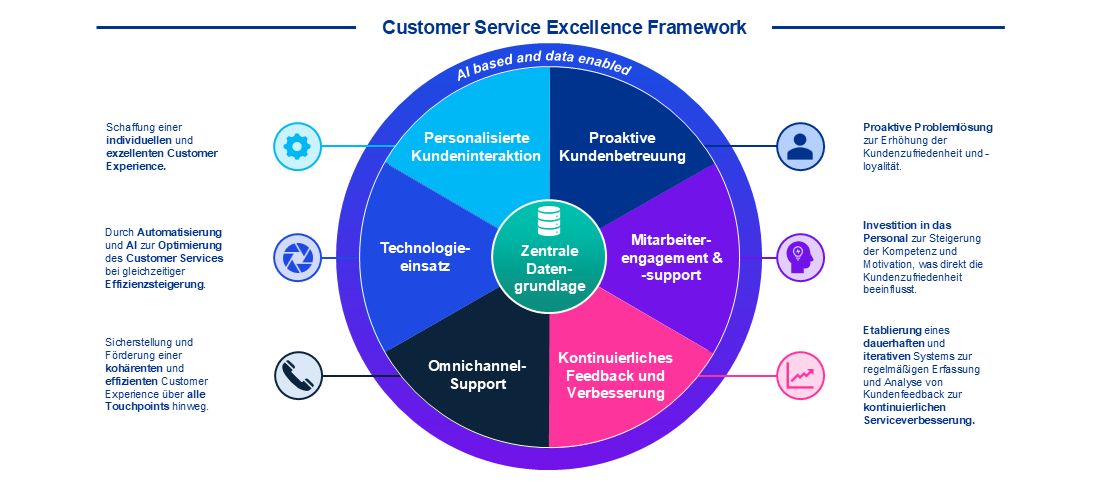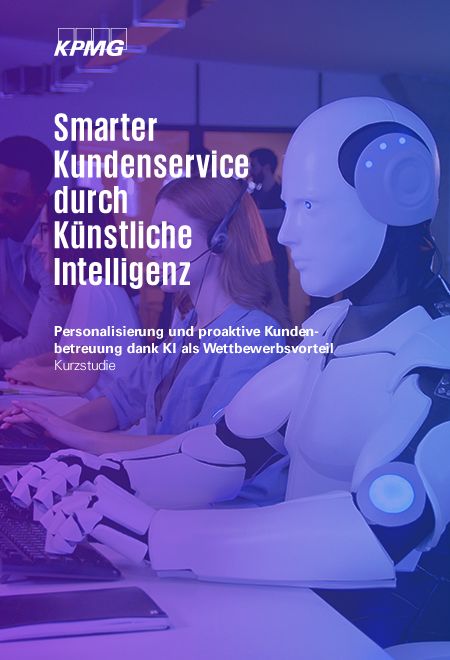Digitalisation has fundamentally changed customer service and rising customer expectations require increasingly personalised and proactive interactions. Artificial intelligence (AI) plays a key role in helping companies to fulfil customer needs more efficiently and strengthen relationships with end consumers in the long term.
AI offers a range of possibilities - from analysing historical data to automating individual, context-related offers - and can thus create a decisive competitive advantage in modern customer service.
How companies are already using AI - and what they still hope to gain from the technology
Despite the many possibilities, AI is still being used rather cautiously in many companies or the use of the technology is still in its infancy. The use of the technology is still in its infancy. We asked companies how much they already rely on AI in the area of customer service and what potential they are still leaving untapped. Based on this, we analyse which steps companies should take in order to take full advantage of these technologies.
Jörg Schwarz
Director, Consulting, Technology Transformation
KPMG AG Wirtschaftsprüfungsgesellschaft
The core results of our survey
of companies without a clear AI strategy fail to exploit the potential of personalised customer interactions - and thereby miss out on decisive competitive advantages.
of companies that actively support employees in using AI achieve optimised effectiveness in customer service - and thus increase their service quality and customer satisfaction.
of companies with well-trained employees use AI intensively for personalised product recommendations - and thus increase their sales opportunities and customer loyalty.
of companies with a clear AI strategy are already successfully using a personalised customer approach - giving them a clear advantage in the market.
of companies that provide little support to their employees are barely or not at all exploiting the potential of AI in customer service - and therefore risk falling behind the competition.
of companies with insufficiently trained employees make little or no use of AI for personalised product recommendations - and thus miss out on significant opportunities to increase customer loyalty and sales.
Proactive and personalised: The competitive advantage of AI-supported customer interactions
By holding back on the use of AI, many companies are missing out on valuable efficiency gains. For example, AI enables an automated, personalised customer approach in real time and can increase customer satisfaction and loyalty. Successful use of AI in customer service requires, among other things, a clear strategy and targeted employee training in order to make personalised interactions effective. The results of our analysis show that companies with a well-thought-out AI strategy and well-trained employees can achieve significant improvements in areas such as product recommendations (e.g. Next Best Offer), data analysis and demand recognition.
The three most important steps for a successful AI implementation
In order to utilise the opportunities of AI in customer service and overcome the obstacles, we believe the following steps are crucial:
A comprehensive AI strategy should define specific areas of application and take into account the integration of high-quality real-time data. It forms the basis for data-based decisions and enables resources to be utilised efficiently.
A holistic target operating model helps to overcome skills shortages and optimise processes. The enablement concept ensures that employees have the necessary skills to use AI effectively.
The establishment of a permanent system for regularly recording and analysing customer feedback enables continuous service improvement.
The key to AI success in customer service
The Customer Service Excellence Framework developed by KPMG identifies the key drivers of excellent customer service. At a time when the customer service touchpoint is critical, a customised, AI-powered approach can make the difference between satisfied customers and enthusiastic brand ambassadors. Personalised, proactive customer service is therefore not just an expectation, but a success factor for future-oriented companies. Our brief analysis therefore focuses primarily on customer service, an essential component of the customer journey.

Chart (in German)
The KPMG Customer Service Excellence Framework offers companies a sound basis for optimising their customer service through AI. With a comprehensive maturity assessment, the framework analyses the current status, identifies strengths and opportunities and highlights short-, medium- and long-term needs for action. Based on this analysis, targeted use cases can be derived that strengthen a company's AI strategy and drive its implementation. A target operating model and a customised enablement concept ensure that employees are optimally prepared for the use of AI, while continuous customer feedback serves as the key to flexible adaptation and optimisation - a decisive competitive advantage in modern customer service.


